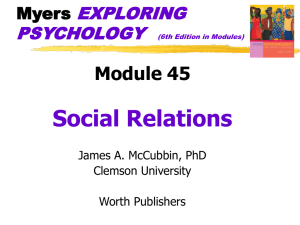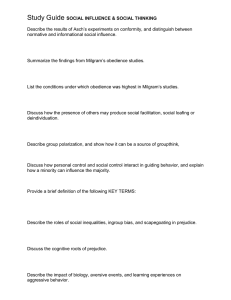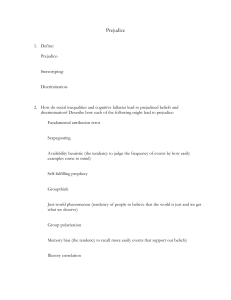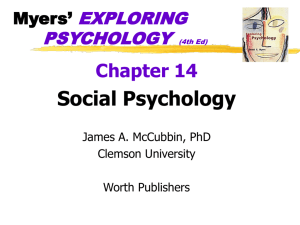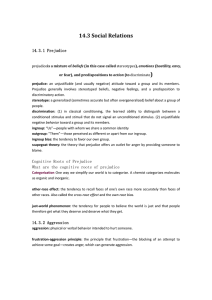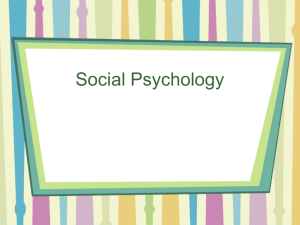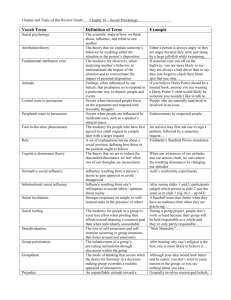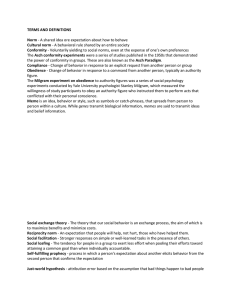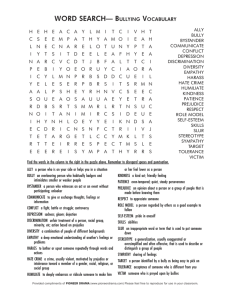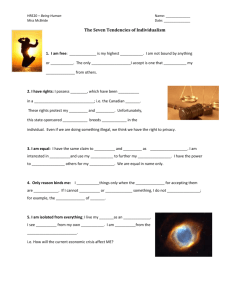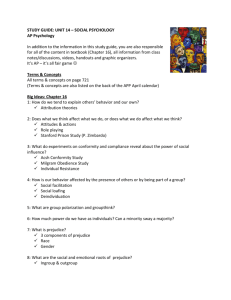Name: Social Psychology Test Matching: Select the letter from the
advertisement
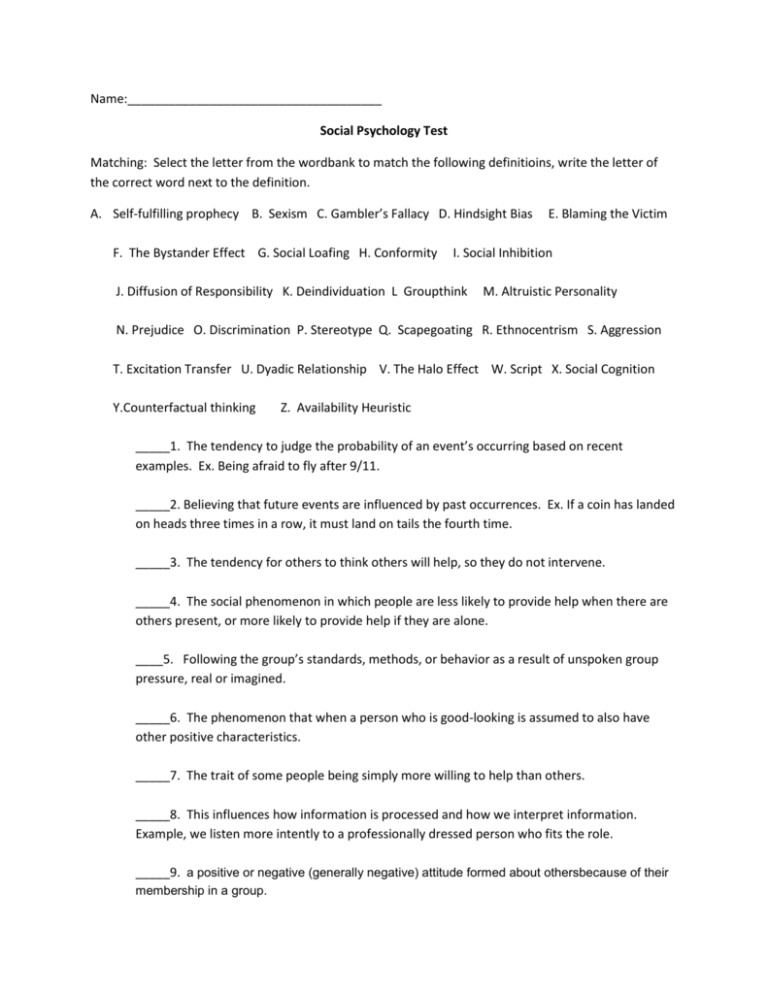
Name:_____________________________________ Social Psychology Test Matching: Select the letter from the wordbank to match the following definitioins, write the letter of the correct word next to the definition. A. Self-fulfilling prophecy B. Sexism C. Gambler’s Fallacy D. Hindsight Bias F. The Bystander Effect G. Social Loafing H. Conformity E. Blaming the Victim I. Social Inhibition J. Diffusion of Responsibility K. Deindividuation L Groupthink M. Altruistic Personality N. Prejudice O. Discrimination P. Stereotype Q. Scapegoating R. Ethnocentrism S. Aggression T. Excitation Transfer U. Dyadic Relationship V. The Halo Effect W. Script X. Social Cognition Y.Counterfactual thinking Z. Availability Heuristic _____1. The tendency to judge the probability of an event’s occurring based on recent examples. Ex. Being afraid to fly after 9/11. _____2. Believing that future events are influenced by past occurrences. Ex. If a coin has landed on heads three times in a row, it must land on tails the fourth time. _____3. The tendency for others to think others will help, so they do not intervene. _____4. The social phenomenon in which people are less likely to provide help when there are others present, or more likely to provide help if they are alone. ____5. Following the group’s standards, methods, or behavior as a result of unspoken group pressure, real or imagined. _____6. The phenomenon that when a person who is good-looking is assumed to also have other positive characteristics. _____7. The trait of some people being simply more willing to help than others. _____8. This influences how information is processed and how we interpret information. Example, we listen more intently to a professionally dressed person who fits the role. _____9. a positive or negative (generally negative) attitude formed about othersbecause of their membership in a group. _____10. is any behavior, whether physical or verbal, intended to hurt another. _____11. is a mode of thinking that occurs when the desire for unanimity in a decision-making group overrides a realistic appraisal of alternative courses of action. This mode of thinking can result in bad group decisions when, rather than defend their own ideas, individual group members simply go along with the group. _____12. is giving up normal behavioral restraints to the group. Being less self- conscious and restrained in a group situation may account for mob behavior. Example: Looting during LA Riots. _____13. when people have thoughts on how past events might have turned out differently. For example, a person thinks about how life would be different if he or she had not ended a past relationship. _____14. relationships that form between two individuals. _____15. when participants engaged in a procedure that elicited anger and then were physiologically aroused, they behaved more aggressively than other participants who were not exposed to both arousing conditions. _____16. occurs when our expectations cause us unconsciously to act in a manner to bring ab out behaviors that confirm our expectations. _____17. an expectation about how a certain event or situation should unfold. _____18. “She deserved to be assaulted because she wore revealing clothes.” _____19. is the behavior that affects members of a targeted group _____20. beliefs about a group are applied to all members of that group (e.g.,females are gentle, kind, and nurturing). _____21. is judging a person’s own ethnic, racial, or national group as “correct” or “best” and judging outgroups by that standard. Examples—U.S. students might believe their educational system to be “right” and “good,” while other models are “wrong” or “bad,” _____22. blaming an entire outgroup for social or economic frustrations. Example—Hitler blamed Jews for the economic problems in Germany. _____23. is the study of how information about people is processed and stored. Our thoughts, perceptions, and beliefs about people are influenced by the social context in which we interact with people. _____24. the tendency to overestimate how predictable an event was once the outcome is known. Following elections, people might comment that the results were predictable, discounting that the results were actually not so predictable in the weeks leading up to the election. _____25. The mere presence of others can impair performance on tasks that one is not particularly good at (e.g., a novice pool player will perform less well in front of a group). _____26. prejudice directed at women because of their gender 27. Compare and Contrast the Heaven’s Gate Cult to the Jonestown Massacre. Try to use at least three terms discussed in class. 28. Describe a situation in which the bystander effect was demonstrated. 29. List the Causes of Agression: 1234567830. How can “Lookism” or discriminatory treatment of people based upon their looks effect people in their daily lives? 31. Describe how the concept of Obedience was tested in the Milgram Experiment. 32. Which method of Compliance would you use to try to get your parents to let you stay out past curfew? 33. Give an example of the Fundamental Attribution Error. 34. What are the three perspectives that suggest how Deindividuation affects behavior? abc35. Describe two effects that Mrs. Elliot’s Blue-Eyes/Green-Eyes classroom experiment had on the students? 1- 2- 36. Give an example of the Self-Serving Bias in action, or observed with friends or someone you know. 37. What lessons or activities have been the most memorable, fun, or interesting? 38. What is your name?
